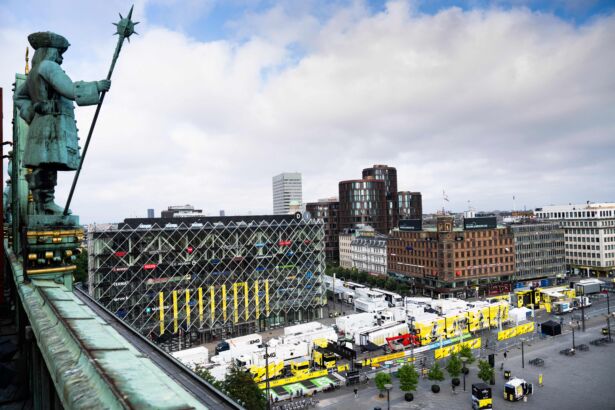There’s cause for optimism in the latest report on world happiness.
For one, benevolence is about 25 percent higher than it was pre-pandemic.
“Benevolence to others, especially the helping of strangers, which went up dramatically in 2021, stayed high in 2022,” John Helliwell, one of the authors of the World Happiness Report, said in an interview with CNN.
And global happiness has not taken a hit in the three years of the COVID-19 pandemic. Life evaluations from 2020–2022 have been “remarkably resilient,” the report says, with global averages basically in line with the three years preceding the pandemic.
“Even during these difficult years, positive emotions have remained twice as prevalent as negative ones, and feelings of positive social support twice as strong as those of loneliness,” Helliwell said in a news release.
The report, which is a publication of the UN Sustainable Development Solutions Network, draws on global survey data from people in more than 150 countries. Countries are ranked on happiness based on their average life evaluations over the three preceding years, in this case, 2020–2022.
The report, which was released on Monday, identifies the happiest nations, those at the very bottom of the happiness scale, and everything in between, plus the factors that tend to lead to greater happiness. March 20 is the International Day of Happiness, a day designated by the United Nations that’s marking its 10th anniversary in 2023.
6-Year Winning Streak for the World’s Happiest Nation
For the sixth year in a row, Finland is the world’s happiest country, according to World Happiness Report rankings based largely on life evaluations from the Gallup World Poll.
The Nordic country and its neighbors Denmark, Iceland, Sweden, and Norway all score very well on the measures the report uses to explain its findings: healthy life expectancy, GDP per capita, social support, low corruption, generosity in a community where people look after each other and freedom to make key life decisions.

But since we can’t all move to Finland, is there something other societies can learn from these rankings?
“Is it, are they doing things that we wish we’d seen before and we can start doing? Or is it something unique about their climate and history that make them different? And fortunately, at least from my perspective, the answer is the former,” said Helliwell, who is a professor emeritus at the Vancouver School of Economics, University of British Columbia.
Taking a holistic view of the well-being of all the components of a society and its members makes for better life evaluations and happier countries.
“The objective of every institution should be to contribute what it can to human well-being,” the report says, which includes accounting for future generations and preserving basic human rights.
Israel moves up to No. 4 this year from its No. 9 ranking last year. The Netherlands (No. 5), Switzerland (No. 8), Luxembourg (No. 9), and New Zealand (No. 10) round out the top 10.
Australia (No. 12), Canada (No. 13), Ireland (No. 14), the United States (No. 15), and the United Kingdom (No. 19) all made it into the top 20.
While the same countries tend to appear in the top 20 years after year, there’s a new entrant this year: Lithuania.
The Baltic nation has been climbing steadily over the past six years from No. 52 in 2017 to No. 20 on the latest list. And the other Baltic countries, Estonia (No. 31) and Latvia (No. 41), have been climbing in the ranks, too.
“It’s essentially the same story that’s playing out in the rest of Central and Eastern Europe,” Helliwell said.
Countries in those regions “probably have normalized that post-1990 transition and [are] feeling more solid in their new identity” as the years pass, he said.
France dropped out of the top 20 to No. 21 in this year’s report.
At the very bottom of the list is Afghanistan at No. 137. Lebanon is one rank above at No. 136. Average life evaluations in these countries are more than five points lower (on a scale from 0–10) than in the 10 happiest countries.
Looking Forward
The disruptions of the pandemic have spurred a lot of reflection.
“People are rethinking their life objectives,” Helliwell said. “They’re saying, ‘I’m going back, but what am I going back to? What do I want to go back to? How do I want to spend the rest of my life?'”
He’s hoping this “move towards thinking about values and other people more explicitly” will affect not just factors such as which jobs or schools people choose, but also how they operate within those environments.
“It isn’t really about the grades or the salary, it’s about cooperating with other people in a useful way. And of course, that’s useful for the world, but the whole point of this happiness research is that it’s also good for the people doing it.
“In other words, you do end up feeling better about yourself if you’re actually looking after other people rather than number one.”
World’s Happiest Countries for 2023
1. Finland
2. Denmark
3. Iceland
4. Israel
5. Netherlands
6. Sweden
7. Norway
8. Switzerland
9. Luxembourg
10. New Zealand
11. Austria
12. Australia
13. Canada
14. Ireland
15. United States
16. Germany
17. Belgium
18. Czech Republic
19. United Kingdom
20. Lithuania
The CNN Wire contributed to this report.
